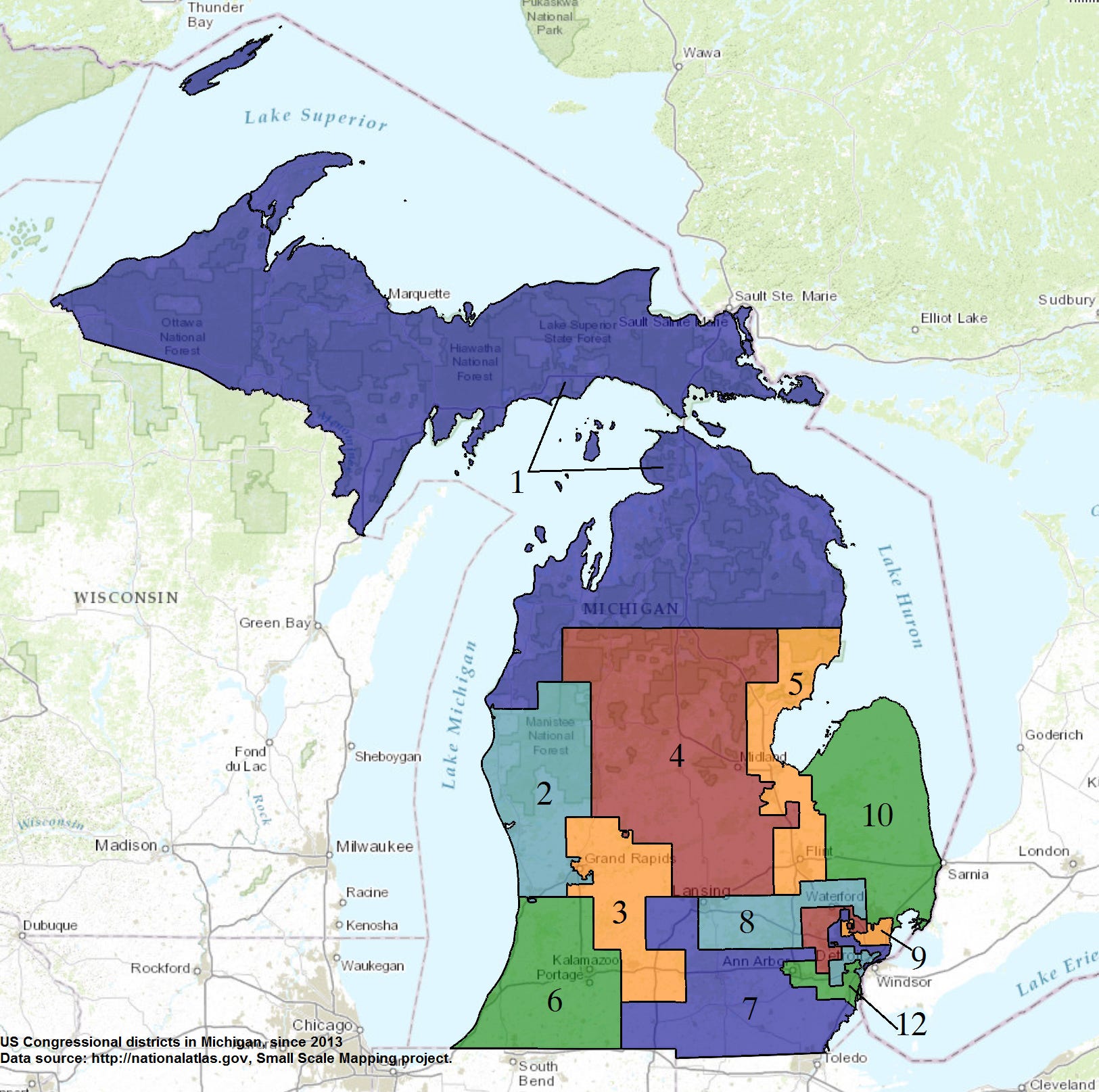Supreme Court rejects GOP delay bid in gerrymandering lawsuit
 Jonathan Oosting
Jonathan Oosting
Lansing — GOP mapmakers focused on protecting U.S. Rep. Tim Walberg from 2012 challengers by making his district more Republican, according to new emails disclosed in a federal gerrymandering lawsuit that is heading to trial Tuesday.
The U.S. Supreme Court through Justice Sonia Sotomayor on Monday denied a Republican request to delay the trial, set to start at 9 a.m. at the Theodore Levin U.S. Courthouse in Detroit.
Attorneys for Michigan House Speaker Lee Chatfield, state Rep. Aaron Miller and several congressional Republicans had sought postponement as the Supreme Court considers separate gerrymandering cases out of Maryland and North Carolina.
Plaintiffs in the Michigan case on Saturday disclosed a series of new emails that could bolster their claims that maps approved by the Republican-led Legislature in 2011 intentionally diluted the power of Democratic voters to benefit GOP politicians.
GOP mapmakers focused on helping Walberg by making his district more Republican, according to one exchange plaintiffs are asking the federal court to admit as evidence at trial.
Congressional mapmaker Jeff Timmer in June of 2011 forwarded an email to then-Gov. Rick Snyder’s deputy legal counsel David Murley describing how proposed changes to Walberg’s district would affect the 3rd District seat held by fellow GOP Rep. Justin Amash.
“No question the new (3rd) district is a bit less GOP, but not so much that it is in jeopardy of going south on us,” Timmer wrote. “It was intended that the new 3rd would become slightly less Republican in order for the Walberg seat to become slightly more so.”
Walberg was first elected to the U.S. House in 2006 but narrowly lost his seat to Democrat Mark Schauer in 2008. He narrowly won re-election over Schauer in 2010 before his district was reconfigured.

Schauer’s home in Battle Creek was drawn out of the 7th District and into Amash’s 3rd in an apparent bid to discourage another rematch, although House members aren't required to live in the congressional district they represent.
Timmer told Murley he had sent the email to “one of our allies who was working to convince Justin Amash to be reasonable…”
Previously released emails showed Amash had raised concerns during the 2011 redistricting process. The congressman in October told The Detroit News he had been “trying to prevent what I viewed as a political gerrymander.”
Redrawn map worried Amash
The libertarian-leaning lawmaker from Cascade Township is the only member of Michigan’s GOP congressional delegation who is not fighting the federal lawsuit filed on behalf of the League of Women Voters and a series of Democrats.
Amash told The News he was particularly wary of early 2011 draft maps that proposed splitting up Grand Rapids, an increasingly Democratic city, and the final version of the map that did split up his home of Kent County in what he called an “unnatural” way.

Timmer on Monday declined to discuss his eight-year-old email. A spokesman for Walberg said the Tipton Republican did not personally push to make his district more Republican.
"Congressman Walberg's focus then, as it is now, was serving his constituents," said Dan Kotman.
In a separate June 2011 email previously disclosed in court, GOP strategist Greg McNeilly told Timmer that Amash was "concerned with Calhoun,” referencing the county southeast of Kent that includes Battle Creek.
“I took it to mean that adding recently former Congressman Mark Schauer into his district was a concern,” Timmer said last year in a sworn deposition.
Schauer, who helped launch the National Democratic Redistricting Committee in 2016 but no longer works as an adviser for the group, said Monday he is "not surprised" that mapmakers tried to make Walberg's district more Republican for 2012.
"I think it was part of a systematic Republican strategy that started in 2010 all across the country," he said. "It doesn't feel good to be a victim of that, but it certainly confirms what I felt at the time."
Trial looms
Plaintiff attorneys are attempting to admit several new documents before the trial begins Tuesday morning. The lawsuit seeks to force changes to GOP-drawn districts prior to the 2020 elections. A voter-approved independent redistricting commission will map new lines for 2022 and beyond.
Federal judges on Friday rejected a proposed settlement between plaintiffs and Democratic Secretary of State Jocelyn Benson that would have forced reconfiguration of at least 11 state House districts.
The new emails suggest Michigan mapmakers were sharing proposals with national GOP leaders as they drew current congressional districts. Timmer sent several files to the National Republican Congressional Committee on May 27, 2011, according to one message.
Early on in the process, GOP attorney Eric Doster told local redistricting officials he had spoken with Dale Oldham of the Republican National Committee, who wanted Michigan mapmakers to call Tom Hofeller, the national party’s redistricting coordinator.
Documents obtained from the GOP mapmakers include a “redistricting essentials” memo from Hofeller, Oldham and other RNC officials.

“Now that we have had a spectacular election outcome, it’s time to make sure the Democrats cannot take it away from us in 2011 and 2012,” the memo said.
The memo directed state mapmakers to prepare election history data to incorporate into redistricting databases and offered training on advanced mapping software. The RNC also also warned that states were likely to face lawsuits over their completed maps.
“You should already have a legal strategy and access to experienced redistricting counsel,” the memo said. It urged state-level Republicans to “avoid misstatements in public or emails,” suggesting they stick to “simple” explanations, such as “We want a FAIR process that follows all the requirements of the law.”
Supreme Court considerations
Republicans in the state House, Senate and Congress had asked the U.S. Supreme Court to delay the Michigan trial ahead of late March oral arguments in the North Carolina and Maryland cases.
The High Court could rule on “precisely” the same issues in dispute in the Michigan case, “namely, whether such redistricting disputes are justifiable and, if so, what legal and factual standards courts must apply when resolving those disputes,” GOP attorneys said in their initial request.
In a Monday follow-up, Republicans urged justices not to allow Democrats “to abuse the power of the judiciary by wasting significant resources, engaging in political grandstanding, violating legislative and First Amendment privileges, and attempting to embarrass political foes via a public trial in this matter.”
Benson, who inherited the case after taking office in January and is no longer defending the GOP maps, asked the Supreme Court to allow the Michigan trial to begin. Postponing the case would work against the public interest, her attorneys argued.
“As the time until the 2020 election cycle grows shorter, the challenges of completing a remedial redistricting process and implementing a new set of maps inversely grows larger,” Benson's attorneys said.
Plaintiffs echoed that argument, telling the Supreme Court that delaying the trial “could well mean the voters never getting the relief they are after — a reapportionment of Michigan’s legislative districts in time for the 2020 election.”
A new Republican group called Voters Not Donors is among those urging the Supreme Court to delay the trial and contends Benson is unfit to represent the state as a defendant after attempting to negotiate a failed settlement.
Plaintiff attorney Mark Brewer donated $500 to her campaign in 2017, and five of 11 named plaintiffs in the case also contributed to Benson's 2010 or 2018 campaigns, according to the group associated with longtime GOP strategist Stu Sandler.
"Voters Not Donors does not take a position on whether Michigan’s Legislature unconstitutionally gerrymandered Michigan’s voting districts based on partisan politics," attorney John Bursch wrote in a Supreme Court filing. "But the Benson-Brewer settlement agreement leaves little doubt that partisan politics is driving the litigation now."
Benson has downplayed Brewer's contribution. The federal court on Friday ruled she could not settle the case without the blessing of Michigan's Republican-led Legislature.
Benson, who has expressed a belief that current political boundaries were drawn in violation of the state and federal constitutions, said Friday that she respects the court's decision.
"As the state’s chief election officer, I will continue efforts to resolve this lawsuit in the best interests of all voters and in compliance with constitutional requirements," Benson said in a statement.
joosting@detroitnews.com